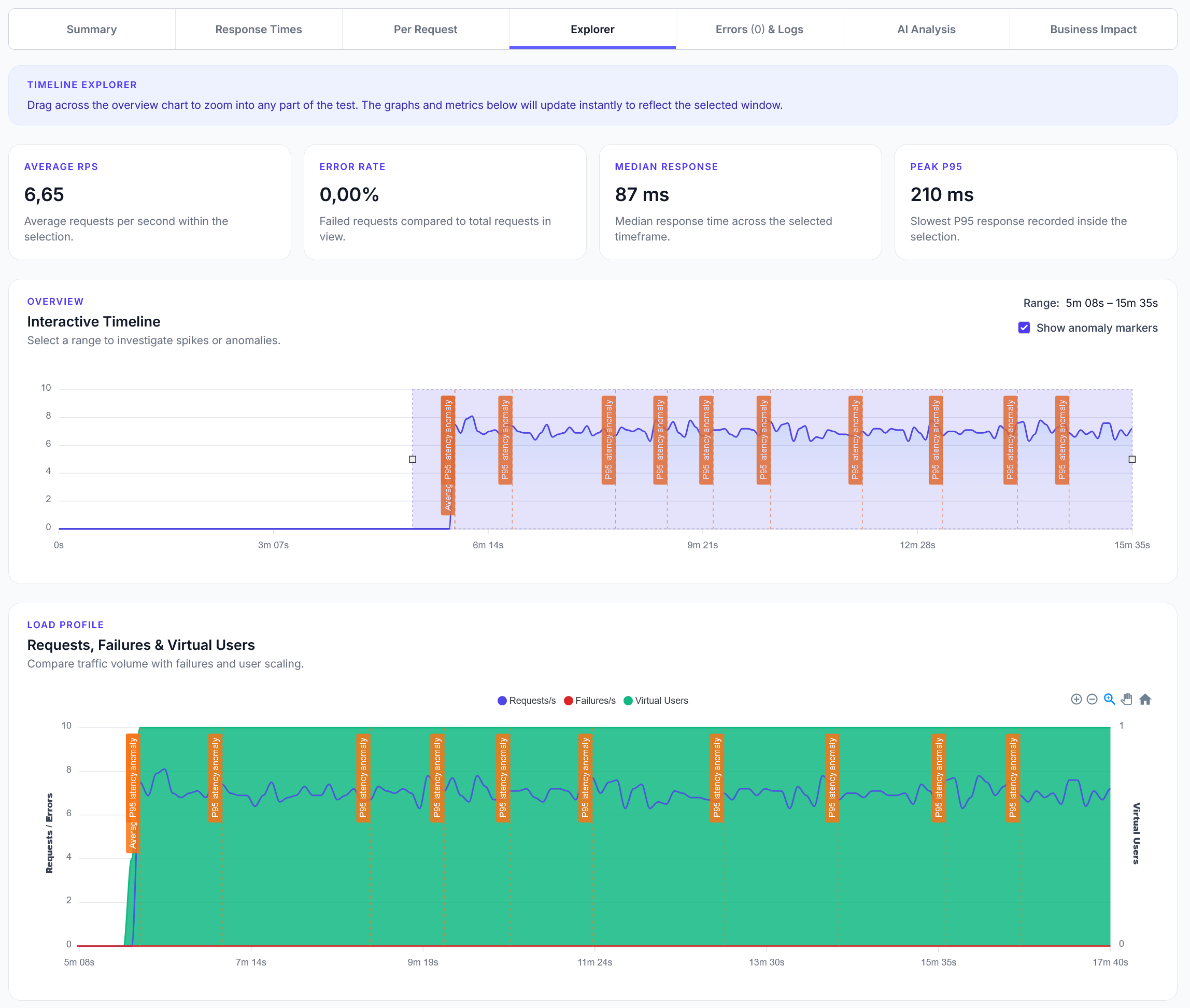
Explorer reports addition
We have added a new Explorer feature to reports, with a timeline scrubber and easy anomaly detection.
Simple load testing for Infura blockchain node endpoints with basic RPC calls
LoadForge can record your browser, graphically build tests, scan your site with a wizard and more. Sign up now to run your first test.
This guide shows how to load test Infura blockchain node endpoints with basic RPC calls. Perfect for testing your Infura project's performance and rate limits.
from locust import task, HttpUser
import json
import random
class InfuraUser(HttpUser):
def on_start(self):
# Replace with your Infura project ID
self.infura_project_id = "your-project-id-here"
self.rpc_url = f"https://mainnet.infura.io/v3/{self.infura_project_id}"
# Test addresses for balance checks
self.test_addresses = [
"0xd8dA6BF26964aF9D7eEd9e03E53415D37aA96045", # Vitalik
"0xA0b86a33E6441b8435b662303c0f479c7e1b5b8e", # USDC
"0xC02aaA39b223FE8D0A0e5C4F27eAD9083C756Cc2" # WETH
]
@task(3)
def get_latest_block(self):
"""Get the latest block number"""
payload = {
"jsonrpc": "2.0",
"method": "eth_blockNumber",
"params": [],
"id": 1
}
with self.client.post(
self.rpc_url,
json=payload,
headers={"Content-Type": "application/json"},
name="Get Latest Block"
) as response:
if response.status_code == 200:
data = response.json()
if "result" in data:
block_number = int(data["result"], 16)
print(f"Latest block: {block_number}")
else:
response.failure("No result in response")
@task(2)
def get_gas_price(self):
"""Get current gas price"""
payload = {
"jsonrpc": "2.0",
"method": "eth_gasPrice",
"params": [],
"id": 1
}
with self.client.post(
self.rpc_url,
json=payload,
headers={"Content-Type": "application/json"},
name="Get Gas Price"
) as response:
if response.status_code == 200:
data = response.json()
if "result" in data:
gas_price = int(data["result"], 16) / 1e9 # Convert to Gwei
print(f"Gas price: {gas_price:.2f} Gwei")
@task(2)
def check_balance(self):
"""Check ETH balance for random address"""
address = random.choice(self.test_addresses)
payload = {
"jsonrpc": "2.0",
"method": "eth_getBalance",
"params": [address, "latest"],
"id": 1
}
with self.client.post(
self.rpc_url,
json=payload,
headers={"Content-Type": "application/json"},
name="Check Balance"
) as response:
if response.status_code == 200:
data = response.json()
if "result" in data:
balance = int(data["result"], 16) / 1e18 # Convert to ETH
print(f"Balance for {address}: {balance:.4f} ETH")
@task(1)
def get_block_details(self):
"""Get details of the latest block"""
payload = {
"jsonrpc": "2.0",
"method": "eth_getBlockByNumber",
"params": ["latest", False],
"id": 1
}
with self.client.post(
self.rpc_url,
json=payload,
headers={"Content-Type": "application/json"},
name="Get Block Details"
) as response:
if response.status_code == 200:
data = response.json()
if "result" in data and data["result"]:
block = data["result"]
tx_count = len(block.get("transactions", []))
print(f"Block {block.get('number')} has {tx_count} transactions")
your-project-id-here with your actual Infura Project ID